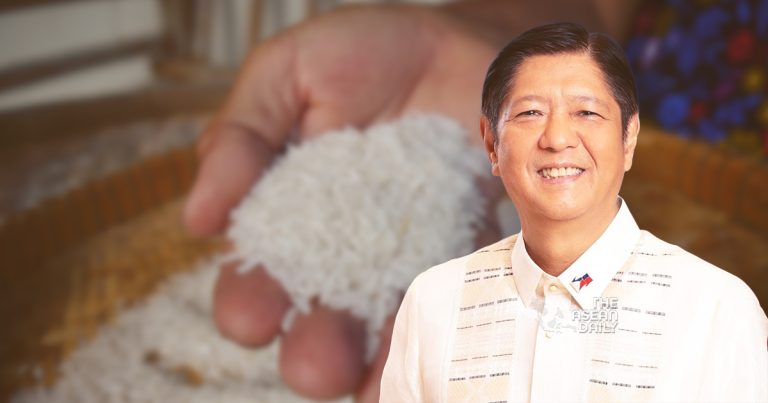18-8-2023 (MANILA) President Marcos expressed his backing for the review of the Rice Tariffication Law (RTL) or Republic Act 11203, with the aim of restoring the powers of the National Food Authority (NFA) in light of concerns regarding rice supply and the surge in prices. This announcement was made by a high-ranking official from the Department of Agriculture (DA) yesterday.
Agriculture Assistant Secretary and Deputy Spokesman Rex Estoperez revealed in an interview with The STAR that President Marcos had voiced his support for the review of the RTL during a meeting with stakeholders at Malacañang, organized by the Philippine Council for Agriculture and Fisheries (PCAF).
“President Marcos emphasized the need to review the RTL and reinstate the necessary powers of the NFA. Its previous functions should be returned. You cannot completely strip it of its powers,” Estoperez stated.
The RTL had eliminated various regulatory powers of the NFA, including import licensing and warehouse inspection.
“During the dialogue with PCAF, the President highlighted the importance of reviewing the RTL and reevaluating the functions of the NFA. If there is a need to amend its mandate, for example, if purchasing palay (unhusked rice) at P19 per kilo is no longer viable, what measures should be taken? Should the buying price be increased? Should the government provide subsidies?” Estoperez explained.
Estoperez added that Agriculture Senior Undersecretary Domingo Panganiban would also recommend to President Marcos the prioritization of RTL amendments.
“Despite being a staple food and a political commodity, rice was not included in the priority measures. This is why we believe it is crucial to amend the RTL,” Estoperez emphasized.
According to Estoperez, prior to the implementation of the RTL, the required rice inventory was set at 90 days, with 60 days allocated for the private sector and 30 days for the NFA. Under the RTL, the private sector needs to maintain at least 81 days of inventory, while the NFA is required to have a stock that can last for nine days.
Currently, the remaining stock of the NFA stands at only 46,000 metric tons, which is sufficient for a mere 1.3 days.
Estoperez further revealed that, based on discussions with rice importers, they are advocating for the inclusion of sanctions against exporters who fail to honor contracts in the amendment of the RTL.
He stated that the importers’ recommendation would be submitted to Undersecretary Panganiban, who would then forward the feedback to Malacañang.
Meanwhile, Estoperez disclosed that the importers have committed to selling 100,000 five-kilo sacks of rice at P38 per kilo in impoverished areas such as Baseco, in order to assist the poor amidst the soaring retail prices of this essential food staple.
According to the Department of Agriculture’s monitoring, the retail prices of locally produced regular milled rice currently reach as high as P50 per kilo, while local well-milled rice is sold at P52 per kilo, local premium rice at P56 per kilo, local special rice at P60 per kilo, and imported rice at P65 per kilo.
DBP Grants P500 Million Loan to Boost Rice Production in Albay
In a bid to enhance rice production in Albay and contribute to the country’s food security, the state-run Development Bank of the Philippines (DBP) has provided a P500-million loan.
The DBP extended credit assistance to farmer cooperatives in Albay to promote sustainable and efficient farming practices in the province.
The financing will support the Digital Rice Clustered Farming (DCRF) project, which falls under the bank’s Expanded Rice Credit Assistance as part of the Rice Competitiveness Enhancement Fund.
The project integrates advanced automation, precision farming techniques, and data analytics to optimize resource utilization and increase small farmers’ annual yield by up to 30 percent.
DBP President and CEO Michael de Jesus highlighted that innovative farming initiatives have the potential to elevate the local agriculture sector while empowering Filipino farmers in an ever-changing agricultural landscape.
The DCRF entails consolidating individual farm holdings into larger farms, which would lead to reduced production costs and improved income for farmers by leveraging economies of scale. It also utilizes digital platforms such as satellite imagery, machine learning, and artificial intelligence.
These measures are expected to increase rice production by 28,000 metric tons annually, covering 2,000 hectares of land. With a cluster farm size of 5,000 hectares, there is a potential for a production increase of up to 70,000 metric tons. The project will be piloted in Albay, with five initial farmer cooperatives participating in the cluster farm project.
Proposal to Replace Rice with Other Crops Criticized as Anti-Poor and Insensitive
On Thursday, rice watchdog group Bantay Bigas strongly criticizedthe proposal to replace rice with other crops, labelling it as anti-poor and insensitive. The group argued that rice is a staple food for the majority of Filipinos and any attempt to replace it with other crops would have significant implications for the country’s food security.
Bantay Bigas spokesperson Cathy Estavillo stated, “Rice is deeply ingrained in our culture and it is the main source of sustenance for Filipino families. We cannot simply replace it with other crops without considering the impact on the most vulnerable sectors of society.”
The proposal to diversify crops comes as a response to the challenges faced by the rice industry, including fluctuating prices, supply issues, and the impact of climate change. Proponents of the idea argue that promoting the cultivation of alternative crops could reduce the country’s reliance on rice imports and provide farmers with more profitable options.
However, Bantay Bigas argued that such a shift would disproportionately affect small-scale farmers and low-income consumers who heavily rely on rice as their primary source of calories. They emphasized the need to support rice farmers and ensure the availability and affordability of rice for all Filipinos.
Instead of replacing rice, Bantay Bigas called for comprehensive support measures for the rice industry, including improved irrigation systems, access to affordable credit, and adequate government interventions to stabilize prices and protect farmers from market volatility.




